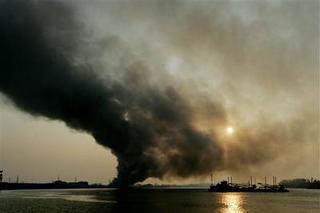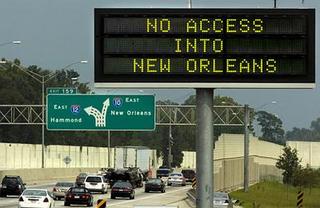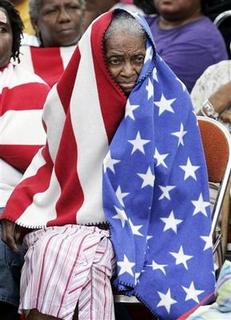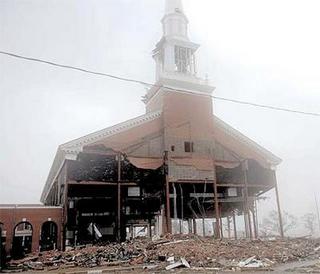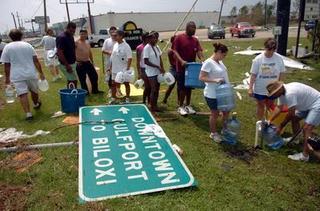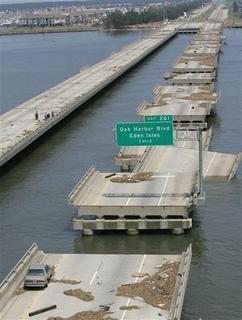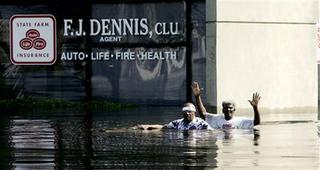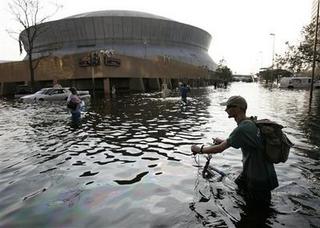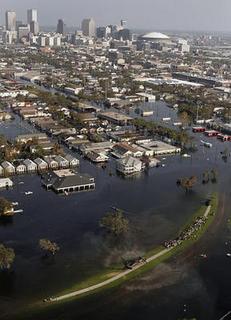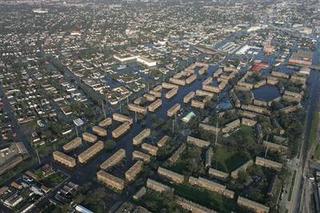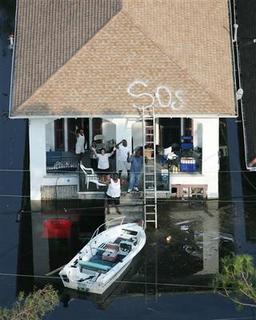Rehnquist dies
Breaking news:Chief Justice William Rehnquist has died.There will soon be a good deal of discussion about Rehnquist's replacement, much of it excessively partisan, but, for now, let us mourn the loss of one of America's most prominent and influential jurists.
New Orleans, a city of the dead and the dying
What is left of New Orleans? With tens of thousands already evacuated, and with evacuations continuing, the city is now left to the dead and the dying:Thousands more bedraggled refugees were bused and airlifted to salvation Saturday, leaving the heart of New Orleans to the dead and dying, the elderly and frail stranded too many days without food, water or medical care.
No one knows how many were killed by hurricane Katrina’s floods and how many more succumbed waiting to be rescued. But the bodies are everywhere: hidden in attics, floating among the ruined city, crumpled on wheelchairs, abandoned on highways.
And the dying goes on — at the convention centre and an airport triage centre, where bodies were kept in a refrigerated truck.
Gov. Kathleen Blanco said Saturday that she expected the death toll to reach the thousands...
A once-vibrant city of 480,000 people, overtaken just days ago by floods, looting, rape and arson, was now an empty, sodden tomb.
Such has been the destruction of Katrina.

Beslan remembered
Lest we forget, today is the one-year anniversary of the massacre at Beslan, Russia. On September 1, 2004, militants took 1,100 people hostage at Beslan's School No. 1. Two days later, 331 of those hostages, including 186 children, died. Spare some time to remember them, and the event that took their lives, even as attention here remains focused on the aftermath of Katrina.
The mayor and the president
 President Bush and New Orleans Mayor Ray Nagin.Political tensions abound, but it's time to work together. Ultimately, there will be plenty of blame to go around and plenty of time to lay that blame, but, for now, such differences must give way to unity for the sake of a common cause. The victims of Katrina deserve nothing less.
President Bush and New Orleans Mayor Ray Nagin.Political tensions abound, but it's time to work together. Ultimately, there will be plenty of blame to go around and plenty of time to lay that blame, but, for now, such differences must give way to unity for the sake of a common cause. The victims of Katrina deserve nothing less.
Shock and shame: Outrage in the wake of Katrina
Shock, shame, and a lot of anger. I'm not sure how much of it is justifiable, nor where the blame (if any) should be laid, but the national reaction to Katrina and its aftermath is rapidly turning to outrage, much of it directed at the federal government, some of it more directly at President Bush and his administration.At the Times, Maureen Dowd weighs in with typically partisan (anti-Bush) zeal, but Krugman's analysis is more measured:At a fundamental level, I'd argue, our current leaders just aren't serious about some of the essential functions of government. They like waging war, but they don't like providing security, rescuing those in need or spending on preventive measures. And they never, ever ask for shared sacrifice.
Yesterday Mr. Bush made an utterly fantastic claim: that nobody expected the breach of the levees. In fact, there had been repeated warnings about exactly that risk.
So America, once famous for its can-do attitude, now has a can't-do government that makes excuses instead of doing its job. And while it makes those excuses, Americans are dying.
I don't mean to politicize the relief efforts, nor to assign blame along partisan lines, nor even to support such politicization and partisanship from others, but, as the evacuation continues and the death toll rises, with no end yet in sight, it is indeed time to start asking the hard questions and, ultimately, demanding accountability.
See also The Times-Picayune's editorial response to federal support/aid (or the lack thereof).
Still, I tend to think that all the outrage should, for the moment, be kept in check. As Colbert King puts it so well in his column in today's Post, "I'd rather focus on the groups that are rallying to help the victims":
And outrage? It has its place. For that there are targets galore stretching from the New Orleans region to Washington. There will be plenty of time for fault-finding -- a task that we in Washington do oh so well. But not now. This is a time for action.
Katrina is a test for the nation, a critical examination for us all, public and private. That is unless you're inclined to sit this one out in the armchair and second-guess.
United we stand, divided we fall. Those who are suffering in New Orleans and along the Gulf Coast need our help, not our bickering.

Scenes of New Orleans (Photos, Part 6)
Who are the victims?
We've seen them on TV and we've heard about their suffering, but I'm not sure we really know who they are. From the Times:The scenes of floating corpses, scavengers fighting for food and desperate throngs seeking any way out of New Orleans have been tragic enough. But for many African-American leaders, there is a growing outrage that many of those still stuck at the center of this tragedy were people who for generations had been pushed to the margins of society.
The victims, they note, were largely black and poor, those who toiled in the background of the tourist havens, living in tumbledown neighborhoods that were long known to be vulnerable to disaster if the levees failed. Without so much as a car or bus fare to escape ahead of time, they found themselves left behind by a failure to plan for their rescue should the dreaded day ever arrive...
In the days since neighborhoods and towns along the Gulf Coast were wiped out by the winds and water, there has been a growing sense that race and class are the unspoken markers of who got out and who got stuck. Just as in developing countries where the failures of rural development policies become glaringly clear at times of natural disasters like floods or drought, many national leaders said, some of the United States' poorest cities have been left vulnerable by federal policies...
In New Orleans, the disaster's impact underscores the intersection of race and class in a city where fully two-thirds of its residents are black and more than a quarter of the city lives in poverty. In the Lower Ninth Ward neighborhood, which was inundated by the floodwaters, more than 98 percent of the residents are black and more than a third live in poverty.
Clearly, the devastation in New Orleans and along the Gulf Coast has been compounded by issues of race and class. Human suffering may be raceless and classless, but in this context these issues need to be more widely appreciated if we are to understand the full magnitude of what has happened.

Those foot-in-mouth politicians
Over at The Moderate Voice, where I've already contributed a few posts on Katrina, Joe Gandelman has a lengthy piece on all the political fumbling in the aftermath of the storm, specifically by Bush, Rice, and Hastert. Yes, they should have known better. That they didn't is an ongoing embarrassment.
The other side of looting?
My friend and fellow blogger Grace Miao sent me this story. Perhaps not all looting is bad. Perhaps not all looters are to be blamed.Let me also quote from her latest post at Flighty Child:This is stuff out of Dante's Inferno.
The mind can barely grasp at the concept of having to abandon an entire city. New Orleans, after evacuation, may be empty until December.
But this has happened before -- December 26, 2004's tsunami, which shook Asia. The world took notice and came to the aid of those who needed it. There is a melancholy universality in human suffering. One cannot look at another human being in pain and not feel an overwhelming sense of pity. As it sees the devastation, the world will reach out again to help, I am sure of it.
Very well put. The world is looking, and the world is indeed reaching out.
Scenes of New Orleans (Photos, Part 5)
News from New Orleans
I've already provided this link (below), but check here for all the latest from The Times-Picayune. It's updated regularly.In particular, here's an editorial that responds in part to Speaker of the House Dennis Hastert, who in denigrating New Orleans has proven once and for all that he's an insensitive idiot. The editorial's conclusion: "One thing is certain: We will rebuild. New Orleans is worth it. So are the people who call it home." Amen.
Scenes of New Orleans (Photos, Part 4)
Scenes of Mississippi (Photos, Part 1)
Bush and Katrina: An absence of leadership?
An indignant editorial in today's Times notes an appalling lack of leadership on Katrina coming from the White House, particularly in light of President Bush's speech yesterday.As you all know, I'm not exactly one of Bush's biggest boosters, but I'm not sure that he should be the focus of such intense blame in the immediate aftermath of this disaster. Though his words, as usual, offer nothing but shallow comfort amid trite calls for sacrifice, I'm sure that the president, whatever his limitations as a leader and the weaknesses of his politics, will continue do what he can to mobilize the federal government in support of the relief efforts and, on behalf of all Americans, to offer compassion and sympathy to those who have been affected by Katrina.I'll have more to say about the politics of it all, but now is not the time.
Scenes of New Orleans (Photos, Part 3)
Canada responds to Katrina
Public Safety and Emergency Preparedness Canada, a department of the Government of Canada, has set up an information page to help Canadians locate friends/relatives and donate to the Canadian Red Cross and registered charities.Direct links:In addition, both the prime minister and the government have issued statements to address the aftermath of Katrina and the ongoing state of emergency in New Orleans and along the Gulf Coast.Prime Minister Paul Martin (issued yesterday):"Like all Canadians, I am distressed by the destruction and loss of life wrought by Hurricane Katrina. On behalf of the Government of Canada and all Canadians, I offer our sincere condolences to the American people. During this most difficult time, Canada stands with you, and we are ready to provide whatever support you may require in the days, weeks and months ahead.
"Even before the enormity of the devastation became clear, I asked Deputy Prime Minister Anne McLellan to lead the Government of Canada’s response to any requests for assistance. We are continuing to monitor the situation closely. I know that she and a number of her Cabinet colleagues have been in touch with their American counterparts and have begun to determine what assistance Canada can offer. We have made it clear that we are prepared to offer any and all possible assistance, and we will continue to work closely with our neighbours as they deal with this terrible event."
The Government of Canada (issued yesterday):The Government of Canada today responded to the unfolding crisis in the southern United States in the wake of Hurricane Katrina.
"This hurricane was one of the most powerful to hit the United States in recorded history," said Honourable Anne McLellan, Deputy Prime Minister and Minister of Public Safety and Emergency Preparedness. "The force of the storm -- combined with the unique geography of the region -- will require relief operations to be undertaken over a long period of time."
Minister McLellan was in contact with U.S. Homeland Security Secretary Michael Chertoff on Monday and informed him that Canada stands ready to provide assistance if needed. Public Safety and Emergency Preparedness Canada (PSEPC) is coordinating federal assistance efforts in the event that a formal request is made from the United States’ Federal Emergency Management Agency (FEMA). No request for assistance has been received at this time.
"Following on our offer, the United States Department of Health and Human Services today asked for information on the kind of emergency assistance that our Public Health Agency could provide, and to which our officials are now responding," added the Minister.
"In addition, we continue to work with our partners in provincial and territorial governments to identify what goods and services we could provide to our American neighbours, should they request our assistance. The United States has a long and proud history of assisting other countries in times of crisis, and we now stand ready to help them in their time of need."
Financial donations are the most effective way for individual Canadians to assist in the relief efforts. Those wishing to donate may contact the Canadian Red Cross’s 2005 Hurricane Fund at 1-800-418-1111 or online at www.redcross.ca.
Needless to say, we Canadians stand by our American friends in this time of need.

Scenes of New Orleans (Photos, Part 2)
Scenes of New Orleans (Photos, Part 1)
Nightmare in New Orleans
Here's the latest:National Guard troops by the thousands moved into this storm-ravaged city today as state and local officials struggled to reverse a growing sense of anarchy sparked by reports of armed looters, bodies floating untouched in stagnant floodwaters, and food and water supplies dwindling for thousands of trapped and desperate residents...
With New Orleans 80 percent under water, officials are just beginning the process of moving 20,000 or so refugees overflowing from the Superdome to Houston, even as other residents in the city were still being rescued from their water-logged neighborhoods. There were numerous reports - and rumors - of fights and disorder in the streets, worsened by unreliable communications. But there was no doubt that people were becoming more desperate as food and clean water ran out.
As I catch glimpses on TV today of what's going on in New Orleans and along the Gulf Coast, and as I follow the story more closely online at various news sites and blogs, I realize that there's really not much I can add here at The Reaction. There will be time for commentary and analysis in the days, weeks, and months ahead, but, for now, I'll keep linking to interesting and informative articles/posts and offer brief observations, though I'll also keep posting on non-Katrina-related items.***Please add a comment or e-mail me directly if you come across any stories that you think need to be reported or that you think are of particular interest. The major news outlets and the top blogs are doing some excellent work, but smaller stories may be receiving less attention.***At Instapundit, Glenn Reynolds provides an ever-expanding list of charities that are supporting the relief effort. Have a look and do what you can.See here for the latest news from The Times-Picayune. Lead stories:Stay tuned for more.

New Orleans: before and after the deluge
 See also the interactive "Impact of Hurricane Katrina" graphic at the Times, which includes a map of the levees and evacuation routes, as well as a detailed look at the oil industry along the Gulf Coast.
See also the interactive "Impact of Hurricane Katrina" graphic at the Times, which includes a map of the levees and evacuation routes, as well as a detailed look at the oil industry along the Gulf Coast.
A stampede of horror in Baghdad
A stampede on a Baghdad bridge has left over 800 people, mostly women and children, dead, and the death toll may end up topping 1,000 (see here):Witnesses said the stampede started after someone screamed that a suicide bomber was in the crowd of pilgrims heading to the Kadhimiya mosque [to commemorate the martyrdom of Imam Moussa al-Khadhem, a prominent figure in Shiite history] in northern Baghdad.
A railing on the bridge then collapsed under the crush of people, and hundreds fell to their deaths in the Tigris River...
Health Minister Abdul Muttalib Ali confirmed that "the chaos that happened at the Al-A'imma bridge" began because of a "rumor" of a bombing.
"This led to a very horrible chaos," he said, causing people "to run in an uncontrolled way and this led to suffocation of so many people and drowning of some of them in the river."
The incident took place three hours after a mortar attack near the same mosque killed seven people and wounded 36 others, police said.
Horrible. Absolutely horrible. "The tragedy was the single biggest loss of life known in Iraq since the March 2003 U.S.-led invasion." (See here for more.)

Sign of the Apocalypse #17: The Apprentice, vulgarity incarnate
 Not humanity at its finest. The Apprentice, perhaps the most vile show on television, returns in double-header fashion on September 21 and 22 -- self-absorption, crass materialism, and unbounded greed all no doubt in full supply.
Not humanity at its finest. The Apprentice, perhaps the most vile show on television, returns in double-header fashion on September 21 and 22 -- self-absorption, crass materialism, and unbounded greed all no doubt in full supply.
Heroism in Katrina's wake
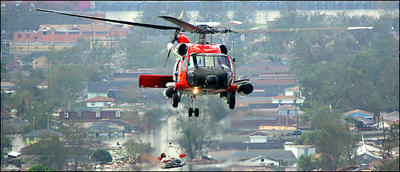 An incredible shot of a Coast Guard helicopter rescue in the New Orleans area.It's not all looting. Whatever else is going on down in New Orleans and along the Gulf Coast and in far worse ways in faraway places like Iraq and Darfur and North Korea, and whatever else may dampen our faith in humanity, there is real heroism to be found in Katrina's wake, with "the largest relief effort since the Sept. 11, 2001, attacks".Difficult times may call for difficult measures and extraordinary sacrifices, but they also seem to bring out the very best in humanity.
An incredible shot of a Coast Guard helicopter rescue in the New Orleans area.It's not all looting. Whatever else is going on down in New Orleans and along the Gulf Coast and in far worse ways in faraway places like Iraq and Darfur and North Korea, and whatever else may dampen our faith in humanity, there is real heroism to be found in Katrina's wake, with "the largest relief effort since the Sept. 11, 2001, attacks".Difficult times may call for difficult measures and extraordinary sacrifices, but they also seem to bring out the very best in humanity.
Fukuyama on Iraq
A must-read. Francis Fukuyama, author of The End of History and the Last Man (and something of a Straussian), writes on the Times Op-Ed page that the Bush Administration "squandered the overwhelming public mandate it had received after Sept. 11" and "alienated most of its close allies, many of whom have since engaged in 'soft balancing' against American influence, and stirred up anti-Americanism in the Middle East":So much attention has been paid to [various] false determinants of administration policy that a different political dynamic has been underappreciated. Within the Republican Party, the Bush administration got support for the Iraq war from the neoconservatives (who lack a political base of their own but who provide considerable intellectual firepower) and from what Walter Russell Mead calls "Jacksonian America" -- American nationalists whose instincts lead them toward a pugnacious isolationism.
Happenstance then magnified this unlikely alliance. Failure to find weapons of mass destruction in Iraq and the inability to prove relevant connections between Saddam Hussein and Al Qaeda left the president, by the time of his second inaugural address, justifying the war exclusively in neoconservative terms: that is, as part of an idealistic policy of political transformation of the broader Middle East. The president's Jacksonian base, which provides the bulk of the troops serving and dying in Iraq, has no natural affinity for such a policy but would not abandon the commander in chief in the middle of a war, particularly if there is clear hope of success.
This war coalition is fragile, however, and vulnerable to mishap. If Jacksonians begin to perceive the war as unwinnable or a failure, there will be little future support for an expansive foreign policy that focuses on promoting democracy. That in turn could drive the 2008 Republican presidential primaries in ways likely to affect the future of American foreign policy as a whole.
So where are we now?With the failure to secure Sunni support for the constitution and splits within the Shiite community, it seems increasingly unlikely that a strong and cohesive Iraqi government will be in place anytime soon. Indeed, the problem now will be to prevent Iraq's constituent groups from looking to their own militias rather than to the government for protection. If the United States withdraws prematurely, Iraq will slide into greater chaos. That would set off a chain of unfortunate events that will further damage American credibility around the world and ensure that the United States remains preoccupied with the Middle East to the detriment of other important regions -- Asia, for example -- for years to come.
We do not know what outcome we will face in Iraq. We do know that four years after 9/11, our whole foreign policy seems destined to rise or fall on the outcome of a war only marginally related to the source of what befell us on that day. There was nothing inevitable about this. There is everything to be regretted about it.
If you read one thing today, this should be it. Fukuyama is right on the mark.

Sign of the Apocalypse #16: Love or statutory rape?
Two SOTA in a row!But there's something sad about this one. As reported in the Times:On Sunday evening, Matthew Koso tipped three ounces of formula into his 5-day-old daughter's mouth, then hoisted her atop his shoulder in hope of a burp. On Tuesday morning, he is scheduled to be arraigned on charges for which the newborn is the state's prime piece of evidence.
Mr. Koso is 22. The baby's mother, Crystal, is 14. He is charged with statutory rape, even though they were wed with their parents' blessing in May, crossing into Kansas because their own state prohibits marriages of people under 17.
The Nebraska attorney general accuses Mr. Koso of being a pedophile; they say it is true love...
Outrage over the case has rippled through this town of 4,800 about 100 miles from both Omaha and Kansas City, and to two state capitals. The governor of Kansas, Kathleen Sebelius, embarrassed by her state's status as one of the few allowing children as young as 12 to marry, has said she will propose a raise in the minimum age when the Legislature reconvenes in January.
Meanwhile, [Attorney General] Jon Bruning's office has been deluged with letters, the vast majority angrily urging that he leave the couple alone. One, from a woman named Patricia, said, "I'm sure your time can be better spent putting away real criminals."
With respect to this particular case, my instinct, prior to reflection on the merits of the case, is to side with the couple and to oppose prosecution. But, of course, the law was broken, and I'm not sure I want to see laws prohibiting sex with minors to be ignored or repealed. Such laws, after all, are meant to protect minors, who are too young to consent to sex, from predators. But was Matthew Koso a predator? Did he take advantage of Crystal? I'm not sure, but his recent actions suggest that he means to take responsibility for his actions and otherwise to support his new family. He must be prosecuted, perhaps, but this may be a case where the state would be best advised to go lightly. Indeed, "experts said it was extremely rare for a man to be prosecuted for statutory rape when he has married his minor partner". Probation seems reasonable, along with continued monitoring of the situation, perhaps until Crystal turns 16.
But this may also be an exceptional case that deserves exceptional treatment. Here's the bigger problem (and the SOTA):Studies show that one in five teenagers have sex before they turn 15, and about 150,000 babies are born each year to a minor parent. In Nebraska, there were 25 births to mothers under 15 in 2002, the latest year for which statistics are available. In Kansas, five girls under 15 were married in 2003, three in 2002 and six in 2001.
These statistics are a mere footnote to what has become a widely-circulated human-interest story, but they tell us something about the state of America's youth -- or, at least, about the state of youth in Kansas and Nebraska. And that something isn't good.
For more, see:

Sign of the Apocalypse #15: Looting in Louisiana
Yes, yes, I know, "the life of man" in the state of nature, a "warre of every man against every man," is "solitary, poore, nasty, brutish, and short". I've read my Hobbes.But things are getting ugly in New Orleans, where looting is rampant in the wake of Hurricane Katrina. One observer even referred to the situation in The Big Easy as "downtown Baghdad".Baghdad it's surely not, but the power of nature has released the more brutish side of human nature, the side that society tries to keep carefully suppressed beneath the veneer of civilization. It may be difficult for us to be confronted with our natural, all-too-human brutishness at a time of such devastation and suffering, but the truth, alas, is the truth, whether we like it or not.
Still the other America: The rise of poverty in the United States
In 1962, Michael Harrington wrote The Other America, a masterful examination of poverty in America and one of the major works behind LBJ's Great Society. Juxtaposing the "other" America of the poor, "the economic underworld of American life," with the "familiar" America of the "affluent," Harrington argued that American poverty "twists and deforms the spirit," while the poor themselves are "pessimistic and defeated," "victimized by mental suffering to a degree unknown in Suburbia". Yet this America "is off the beaten track," "hidden today in a way that it never was before". Indeed, "the poor are politically invisible," "increasingly slipping out of the very experience and consciousness of the nation".How much has changed in four decades?Today, the Census Bureau released new figures showing that poverty has increased, with the number of Americans living in poverty rising to 37 million, up 1.1 million from 2003. Of these, a third are children. As a percentage of the population, 12.7% of the population lives in poverty. In 2000, 31.1 million Americans lived in poverty. Since then, the number has risen steadily, to 32.9 million in 2001 and 35.8 million in 2003. In addition, the number of American without health insurance rose to 45.8 million, up from 45.0 million last year.This may or may not have anything to do with President Bush -- I'm not about to make that judgment here -- but it's interesting to note that this increase in poverty is occurring in a time of solid economic growth. Whoever, or whatever, is to blame, I think that John Edwards is right: "America should be showing true leadership on the great moral issues of our time -- like poverty -- instead of allowing these situations to get worse."And so, still, is Michael Harrington: "The other Americans are those who live at a level of life beneath moral choice, who are so submerged in their poverty that one cannot begin to talk about free choice. The point is not to make them wards of the state. Rather, society must help them before they can help themselves... This suffering is such an abomination in a society where it is needless that anything that can be done should be done... In any case, and from any point of view, the moral obligation is plain: there must be a crusade against this poverty in our midst... How long shall we ignore this underdeveloped nation in our midst? How long shall we look the other way while our fellow human beings suffer? How long?"Yes, how long?For more, see:

The power of nature
Wow.(Puts things in perspective, eh? Needless to say, our thoughts are with those who are suffering through this incredible storm.)
Misrepresenting liberalism: How the IDers got it (and still get it) wrong
In response to one of my recent posts on intelligent design (see the follow-up here), Annie of AmbivaBlog wrote this:It isn't genuine relativism. It's a ploy to call "diversity" liberals' bluff and hoist them by their own petard. The religious people behind Intelligent Design believe that God is the Designer. They've simply come up with an argument they think liberals can't refute without exposing their own dogmatism and hypocrisy.
She's right, and I need to clarify my argument: The proponents of intelligent design, including political proponents of the teaching of intelligent design alongside evolution in the schools, are not relativists. Some of them may be, for all I know, but most seem to be absolutists in the sense that they are what we would generally call believers. That is, they believe that God (their God, or at least their version of God, a god) is the Creator, the prime mover behind all life, indeed, behind the universe more generally. Where relativists hold that there is no absolute truth, just a multiplicity of truths determined by power and perspective, creationists, whether open about their beliefs or hiding behind the political convenience of intelligent design, believe that there is but one ultimate and overarching truth.The proponents of intelligent design may not be relativists, but they have adopted the rhetoric of relativism. They know that creationism isn't likely to offer much of a challenge to the teaching of evolution, but speaking the language of diversity, that is, adopting the language of liberalism, or more specifically of the new liberalism that eschews moral absolutes, including the moral absolutes of classical liberalism, and embraces relativism in some form, may force their opponents into an uncomfortable choice: either they accept intelligent design as an equal alternative to evolution or they deny its validity as an equal alternative to evolution and thereby turn hypocritically against their own philosophical foundations.In short, if Annie is right, they expect their opponents, including the proponents of evolution, to cave. But this strategy, such as it is in any way strategic, betrays a serious misunderstanding of their opponents, and that misunderstanding results from a simplistic understanding of liberalism long fostered by its right-wing critics. Forget for a moment that American conservatism is essentially a distillation of classical liberalism, neo-liberalism, mixed with various illiberal strains of modern and pre-modern thought. Forget that America is the liberal nation par excellence. Conservatives have largely succeeded in vilifying liberals and liberalism in the public imagination. If you're a liberal, you're somehow un-American, well out of the mainstream of American life and belief. But they've done this by reducing liberalism -- the political philosophy of life, liberty, property, and the pursuit of happiness -- down to relativism, that is, to moral bankruptcy, to an absence of what are generally referred to as values. In reality, liberals may defend the natural rights of the individual, as those rights were set down by Locke, America's philosopher, and his early-modern liberal contemporaries, but conservatives want you to believe that they represent a profound threat to all things American.To be sure, some of today's liberals are relativists, more or less. But liberalism is the philosophy of a rival absolute truth to creationism, an absolute truth discovered in nature through reason and/or experience. It is not relativism. Relativism, which denies even the primacy of reason and the certainty of experience, is illiberal, just as much so as any illiberal ideology of the right. In short, conservatives have attempted to reduced liberalism down to an element of postmodernism, where nothing is true except the absence of truth, and this is where the proponents of intelligent design have hoped to catch their opponents in that bind.
Conservatives have intentionally distorted liberalism, equating it with illiberal relativism, and the proponents of intelligent design have picked up on that misrepresentation, predicting that their opponents wouldn't have much to say in response to their challenge. Liberals have generally failed to counter the larger conservative offensive, but they are now fighting back. If liberalism is relativism, then there really isn't much to fight for, including evolution. But it isn't.I do not mean to equate liberalism and science. The two are clearly distinct. And it may be true, as one of my other readers put it, that political liberals may believe in intelligent design (although I would suggest in response that such liberals, including certain supporters of the Democratic Party, may actually be philosophically or theologically conservative). But I would argue that science is very much akin to liberalism. Like liberalism, science sought to liberate humanity from the errors of superstition by placing reason above, or at least in contradistinction to, faith. Is it any wonder that many of the early-modern liberals were scientists? Indeed, far from rejecting truth altogether, liberals hold that truth may be uncovered through the scientific method and that, in short, truth must be empirically demonstrable. Evolution is a theory, not a belief, but much of it is empirically true. Creationism is a belief based on biblical revelation, not a scientific theory and certainly not empirically demonstrable. And intelligent design is just silly.Regardless, terms like "liberal" and "conservative" are just labels. What's important is that science, however liberal in a philosophic sense, is not about to give in to such silliness. And now that the proponents of intelligent design are making a name for their silliness, science is finally fighting back. Not by employing the postmodern left's rhetoric of relativism, which wouldn't get it anywhere, but by defending the truth of evolution and empirical truth more generally. As Tufts Professor Daniel Dennett -- author of Darwin's Dangerous Idea and, once upon a time, of a letter to the editor of The Tufts Daily criticizing one of my columns on education and multiculturalism -- put it recently in a brilliant piece in the Times, "contemporary biology has demonstrated beyond all reasonable doubt... that natural selection -- the process in which reproducing entities must compete for finite resources and thereby engage in a tournament of blind trial and error from which improvements automatically emerge -- has the power to generate breathtakingly ingenious designs," a sound, scientific refutation of the central claim of intelligent design, that evolution cannot explain the profound complexity of life.
Ah, but it can.Admittedly (and positively), "genuine scientific controversies about evolution... abound," but intelligent design has failed to offer anything in the way of an alternative to evolution:
To date, the proponents of intelligent design have not produced anything like that. No experiments with results that challenge any mainstream biological understanding. No observations from the fossil record or genomics or biogeography or comparative anatomy that undermine standard evolutionary thinking.
Instead, the proponents of intelligent design use a ploy that works something like this. First you misuse or misdescribe some scientist's work. Then you get an angry rebuttal. Then, instead of dealing forthrightly with the charges leveled, you cite the rebuttal as evidence that there is a "controversy" to teach.
Note that the trick is content-free. You can use it on any topic. "Smith's work in geology supports my argument that the earth is flat," you say, misrepresenting Smith's work. When Smith responds with a denunciation of your misuse of her work, you respond, saying something like: "See what a controversy we have here? Professor Smith and I are locked in a titanic scientific debate. We should teach the controversy in the classrooms." And here is the delicious part: you can often exploit the very technicality of the issues to your own advantage, counting on most of us to miss the point in all the difficult details.
And:In short, no science. Indeed, no intelligent design hypothesis has even been ventured as a rival explanation of any biological phenomenon. This might seem surprising to people who think that intelligent design competes directly with the hypothesis of non-intelligent design by natural selection. But saying, as intelligent design proponents do, "You haven't explained everything yet," is not a competing hypothesis. Evolutionary biology certainly hasn't explained everything that perplexes biologists. But intelligent design hasn't yet tried to explain anything.
To formulate a competing hypothesis, you have to get down in the trenches and offer details that have testable implications. So far, intelligent design proponents have conveniently sidestepped that requirement, claiming that they have no specifics in mind about who or what the intelligent designer might be.
Yes, intelligent design is content-free. It has no place in America's, or anywhere else's, classrooms -- science, philosophy, religion, or otherwise.

Vivek Krishnamurthy at Yale
Vivek Krishnamurthy -- friend, colleague, and recent guest blogger here at The Reaction -- has set off to Yale Law School this weekend. I wish him all the best as he begins the next stage of his life, and I know that he'll do extraordinarily well both at Yale and beyond.While I was on vacation, he wrote some excellent posts on such topics as the Maher Arar case, designer vaginas (SOTA #13), Japan and World War II, the Gaza withdrawal, neoconservative hubris, and the new Moscow-Beijing alliance, and I am happy to report that he has graciously agreed to stay on as an occasional contributor. He'll no doubt be extremely busy down in New Haven, but I look forward to his future posts at The Reaction. I will continue to do the bulk of the writing, of course, but I am confident that this blog, which I hope you are all enjoying more and more, will benefit from Vivek's continued involvement.In the meantime, please join me in sending him off with best wishes from The Reaction.
One night in Bangkok...
...makes a hard man, uh, bigger?In case you missed it, here's one of the stories of the year:Thailand's prime minister is searching for the cabinet colleague who has had a silicone injection to enlarge his penis, according to reports yesterday.
Ahead of a parliamentary debate on an emergency powers decree passed by the government, Thaksin Shinawatra turned instead to a topic of fevered speculation in the country.
"Who did it? Tell me," Mr Thaksin was quoted as asking his ministers. "This has affected the reputation of the cabinet, because the news went round the world. I don't want people to think cabinet members are obsessed with this kind of thing."
According to the Nation newspaper no one present said anything, although a number of male cabinet ministers squirmed in their seats and looked down at the floor.
Mr Thaksin then suggested, tongue in cheek, that the public health minister make inquiries. "The next room is empty," he told him. "Can you use it to check the ministers right now?"
The question has arisen because a woman who claims a plastic surgeon disfigured her face with a silicone injection, and is in turn being sued by the clinic for defamation, asserts that a government minister has had a similar treatment to increase his manhood.
Absolutely hilarious.








